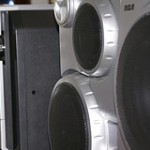 RSS FEED
RSS FEED
Posts Tagged ‘migraine prevention’
Surviving the Perfect Storm
May 15th, 2010
 My Migraine triggers generally include: lack of sleep; sleep at irregular hours; missing meals or going too long without eating (low blood sugar); working hard when tired (over-exertion, let-down after stress); hormonal fluctuations; electrical storms and barometric pressure changes; loud noises; crowds; smoke; crying; change of altitude. Last night I sat through a perfect storm of triggers without actually getting a Migraine. Every trigger but the last three were present.
My Migraine triggers generally include: lack of sleep; sleep at irregular hours; missing meals or going too long without eating (low blood sugar); working hard when tired (over-exertion, let-down after stress); hormonal fluctuations; electrical storms and barometric pressure changes; loud noises; crowds; smoke; crying; change of altitude. Last night I sat through a perfect storm of triggers without actually getting a Migraine. Every trigger but the last three were present.
It went like this: I went to my Friday morning BNI meeting, which involves getting up at 6. That wouldn’t be too bad if I managed to get to sleep by 10 or so, but I never do. I go to sleep between 11 and 11:30 most nights and I have a very hard time cutting my evening shorter. Ideally I would go to bed and get up at the same time every day; it would be best for Migraine prevention and make those Fridays easy to bear. But I live in a household of night-owls and I’ve never been able to reconcile myself to having a completely different schedule from the rest of my family. Besides, most of my favorite tv shows are on from 10 – 11! So I got up and got going on less than 7 hours of sleep.
I worked hard all day, working with an intensive focus towards a deadline. It was a warm muggy day with thunderstorms in the forecast, and the building storm was palpable in the air. Then at the end of the working day I attended a charitable event that I was invited to by a friend. It was really a lovely event, a tour of a designer show-house and a dinner in a tent in the back with a couple of presentations, then arias by a couple of opera singers, and finally they held an auction.
I didn’t make it that long though. The thunderstorms broke while we were touring the house, and it was still raining when we went out to the tent. One of the sponsors of the event was a local appliance store, and one of the presentations was on outdoor kitchens. So they got a great local chef to cook a meal (for at least 100 people) on a huge outdoor grill that was being auctioned off. All a very nice concept, but apparently no one had really thought through how long it would take to grill several courses for 100 or more people. They began serving wine before the presentations started; an hour or more later they passed around some little cubes of grilled bread. The next course, grilled vegetables, came out more than half an hour later. then some grilled seafood at least a half hour after that. Each course was served on large platters to be passed around and shared. Each course gave each of us enough to tantalize but not enough to keep us from being hungry.
All the while there were presentations going on, and a lot of hungry people were drinking more and more wine, talking and laughing louder and louder, halfway drowning out the presentations. Then the opera portion started, and while the singing was excellent, I was right up front and the acoustics of loud operatic singing under a tent with thick humid air all around were overwhelming. Not to mention that people had had quite a bit to drink by that time and were not sitting quietly listening to the music. The competing sounds battered at my ear-drums. The smells from the grill wafted over for hours without any food following for a very long time. After the seafood course we sat even longer without food. I felt increasingly jittery from low blood sugar, worn from lack of sleep and a long hard day, battered by the noise, closed in by the crowd, pressed on by the humidity, shaken by the storms, confused by the multiple inputs and noise, distressed by wanting to be a good guest and not feeling up to it. I had many warning twinges in my temples and felt sure a Migraine was on the way.
My dear and very perceptive friend Izzy could tell something was going on and asked me. I shared with him what was going on in my internal world. He went to the kitchen and told them I needed food right away for a medical condition. He came back with some very rare meat which I ate most of and shared some of with a few of my neighbors. I felt bad because I knew everyone was hungry. I stayed until some more meat came out, which was quite a while later. I had a little and then left to go home. I was able to drive myself home, got in and ate yogurt and cereal with milk, some quick protein and calories. Then I collapsed.
The fact that I didn’t get a Migraine is pretty amazing. My nortriptyline, and my supplements, and my regular eating, and all the sleep I generally get (except on Thursday nights), and my regular walking, and my relaxation exercises, and all the other things I am doing to regulate my system… these are obviously paying off! A year ago I am sure that just the lack of sleep and a few hours of intensive work would have given me a Migraine – I wouldn’t even have made it to the evening event.
On the other hand, I had an exhausted night of very poor sleep, and today I am having a major fibromyalgia flare-up. My everything hurts today. My head is only a little tender, though, no pounding, no intense pain there. That’s still a victory!
– Megan Oltman
Approaching Storm image courtesy of Stephan Mantler.
Tags: fibromyalgia, migraine prevention, Migraine triggers
Posted in Managing, Rant | Comments (0)
Cocoa for Migraine Prevention?
September 28th, 2009
 Results of a research study presented at the International Headache Congress in Philadelphia this month show preliminary indications that a diet rich in cocoa may aid in preventing Migraines. Animal studies suggest that cocoa supresses inflammatory responses in the trigeminal nerve, the main nerve involved in Migraine.
Results of a research study presented at the International Headache Congress in Philadelphia this month show preliminary indications that a diet rich in cocoa may aid in preventing Migraines. Animal studies suggest that cocoa supresses inflammatory responses in the trigeminal nerve, the main nerve involved in Migraine.
There’s some irony here as chocolate is identified as a common Migraine trigger food. This may be because of caffeine or tyramine content, however, rather than cocoa content. I don’t know whether the caffeine or tyramine are present in the cocoa, or in some other ingredient of chocolate. The researchers caution that these are early results. If see benefits in humans as well, maybe they will find a way to isolate the anti-inflammatory parts of the cocoa from any potentially triggering parts.
I would expect to see cocoa supplements or extracts coming down the pike. Since I have the good luck not to be triggered by chocolate (in fact, I get some relief from a Migraine by eating dark chocolate) I am going to start now. Cool weather is here – hot cocoa everyday? Why not! Mole sauce? Yum. I think I can come up with a diet rich in cocoa without too much trouble!
– Megan
Chocolate plate image courtesy of avlxyz/Alpha.
Tags: chocolate, cocoa, International Headache Society, migraine prevention
Posted in Current Affairs, Medicine, Musings | Comments (3)
Time for a Change in Medication
May 23rd, 2009
I am stubborn and it takes a while to convince me. At this point I have to finally admit that Topamax is not  helping me very much. I diary very carefully and keep statistics on my Migraines, and I can say that since I have been on the Topamax I’ve had about a 20% reduction in my Migraines and overall head pain. Better than nothing, but not much to write home about. I started on 25 mg in the evening, tried that for a few months, and the first two months saw my Migraines go from 8 – 10 per month to 5 – 6, but I think that was a fluke, because every month since then has been back up in the 6 – 8 range, which is average for me.
helping me very much. I diary very carefully and keep statistics on my Migraines, and I can say that since I have been on the Topamax I’ve had about a 20% reduction in my Migraines and overall head pain. Better than nothing, but not much to write home about. I started on 25 mg in the evening, tried that for a few months, and the first two months saw my Migraines go from 8 – 10 per month to 5 – 6, but I think that was a fluke, because every month since then has been back up in the 6 – 8 range, which is average for me.
My doctor suggested I take the dosage all at night, so that any sleepiness and cognitive side effects would be mostly worn off by morning. This was okay as far as it went, but I discovered after a while that I was having an awful lot of evening Migraines. I also learned that Topamax is pretty well out of your system after around 22 – 23 hours. So the level in my bloodstream must have been getting pretty low by evening, and Migraines were breaking through at that point. When I pointed that out to my doctor, he said that he wasn’t too concerned about it “just for headaches,” he’d be more concerned if I were on the medication for seizures. I have to say I’m getting a bit concerned with a headache specialist who uses the phrase “just for headaches.”
I decided to split the dose evenly between morning and evening and the Migraine preventive effect definitely increased somewhat, but the cognitive side effects became much more noticeable. So much so that after a month on 75 mg I decided it was intolerable; I was getting next to nothing done in the course of a day. So my doctor was certainly right that taking it all in the evening lessened the side effects, it just lessened the main effects as well! I went back down to 50 mg two weeks ago.
 But even on 50 mg, I’ve been so slow I am hardly getting anything done and I have almost no days where I am full of energy. I just don’t feel like me, at all. I cut down the Topa to 25 yesterday, as per schedule with my doc. Well I took this morning’s half pill (12.5 mg) and felt all my energy and alertness just drain out of me within about 15 minutes – okay, now I’m eager to be done with the stuff!
But even on 50 mg, I’ve been so slow I am hardly getting anything done and I have almost no days where I am full of energy. I just don’t feel like me, at all. I cut down the Topa to 25 yesterday, as per schedule with my doc. Well I took this morning’s half pill (12.5 mg) and felt all my energy and alertness just drain out of me within about 15 minutes – okay, now I’m eager to be done with the stuff!
The problem is where to go next. My doctor is recommending amitryptaline, an old tri-cyclic anti-depressant. Some people experience sleepiness, fatigue, and weight gain on it. I read on line that some of the top Migraine specialists don’t prescribe it because it is “primitive.” It’s actually off the market as an anti-depressant, but for Migraine prevention is prescribed at a much lower dose than for depression. On the other hand, some people experience no side effects.
I’d like to propose some alternatives to my doctor, but I’m feeling a little overwhelmed by the research involved. I look at side effects lists and I don’t like any of them. I read others’ experience but I know that what was true for them won’t necessarily be true for me. I just know that 6 – 8 Migraines a month is too many. I’ve had worse, and many of you out there live with worse. But I am sure I can do better!
– Megan
Still looking for that magic pill!
Block head image courtesy of Stefan; magic pill image courtesy of [O*] ‘BharaT.
Tags: migraine prevention, Migraine preventive medication, migraine specialist, Topamax
Posted in Communicating, Managing, Medicine | Comments (7)
Exercise and Migraine Prevention: Take Two
July 10th, 2008
 I promised to get you some more evidence to answer the question: Does exercise aid in Migraine prevention? And in the interim, this news cropped up: The Journal Headache recently published a review of eight studies and four case reports of exercise as migraine therapy. Dr. Volker Busch of the University of Regensburg, Germany, reviewed the studies, and found that
I promised to get you some more evidence to answer the question: Does exercise aid in Migraine prevention? And in the interim, this news cropped up: The Journal Headache recently published a review of eight studies and four case reports of exercise as migraine therapy. Dr. Volker Busch of the University of Regensburg, Germany, reviewed the studies, and found that
“most studies did not find a significant reduction of headache attacks or duration due to regular exercise. Six of the studies demonstrated a reduction of pain intensity during the intervention.”
Read full coverage at My Migraine Connection. Please note, though, that the answer is not “No.” The answer Dr. Busch’s review provides is that: 1) in the studies reviewed, there was not a significant reduction in number or duration of migraines; and 2) there is not yet sufficient evidence to state with certainty whether or not exercise helps.
Does this mean we give up on exercise? No! I gave you my little piece of anecdotal evidence a few weeks ago in the post Exercise for Migraine Prevention. My update since that time? I have exercised 27 of the last 30 days. I have had 3 migraines in that time. Contrast that with an average of 6.5 migraines per month for the last 7 months, with sporadic exercise. It’s not scientific evidence of anything, mind you. All I can tell you is that exercise is making me feel good!
What does exercise do for us?
- Exercise releases endorphins, which are our body’s own pain-killers.
- Exercise relaxes our muscles – it reduces muscular tension.
- Exercise reduces our general fatigue and helps us sleep better.
- Exercise tones our blood vessels and increases blood flow.
- Exercise reduces anxiety levels and increases relaxation.
- And then there’s all that stuff about a healthy heart, a healthy weight, regulating our blood sugar, just the general things that keep us alive!
Read more on the benefits of exercise from migraine blogger James Cottrill at Relieve-Migraine-Headache.
It stands to reason, I believe, that exercise might reduce migraine frequency or severity. I can’t promise you, of course, that it will do that for you. Migraine is, among other things, an outcome of a sensitive, highly reactive nervous system. Whatever we can do that makes us stronger, healthier, more relaxed, more stress-hardy, ought to make our systems less reactive.
Most of us are also aware of the problem of exercise-generated migraines. The key is to take it slow and gentle. A couple of great articles on how to work in some exercise without setting off migraine are Teri Robert’s 10 Ways for Migraineurs to Sneak in Some Exercise, and Ellen Schnakenburg’s Moving and Exercising and Migraine. Also remember to drink lots of water and avoid hot sun if it’s a problem for you.
I don’t have medical studies to back me up here! But medicine is art as well as science, and I’ll tell you that all my doctors are telling me I need to get regular exercise! So don’t let “it’s not proven” mean “why bother?”
– Megan
Breezy, clear, sun getting lower – time for a walk!
What does that sailboat image have to do with it? That was my daughter’s first solo sail – she was getting some great exercise!
Tags: endorphins, exercise, migraine prevention, vascular health
Posted in Managing, Medicine, Tips & Techniques | Comments (7)
Exercise for Migraine Prevention
June 19th, 2008
 When the wonderful May Migraine and Headache Blog Carnival came out on the topic, “How to integrate exercise into a life filled with migraines,” I was in the midst of my month and a half of viruses, flu and bronchitis, and having several migraines a week, and I couldn’t bring myself to write about exercise, let alone do it. So I submitted a post on Calming Down the Migraine Brain, with relaxation exercises, which are also a good thing!
When the wonderful May Migraine and Headache Blog Carnival came out on the topic, “How to integrate exercise into a life filled with migraines,” I was in the midst of my month and a half of viruses, flu and bronchitis, and having several migraines a week, and I couldn’t bring myself to write about exercise, let alone do it. So I submitted a post on Calming Down the Migraine Brain, with relaxation exercises, which are also a good thing!
Don’t get me wrong, I believe in regular exercise and I know I’m better off when I do it. There’s just a nasty chicken and egg dilemma when you are too sick to get moving. Another familiar dilemma for me is when I’m too stressed and worried to allow myself to drop everything and exercise, even though I know the exercise will reduce my stress and make me more effective at doing the stuff I’m worried about!
Sorry if the title was a bit of a come-on, I am not going to write a post today full of science on why exercise helps prevent migraines. I promise to pull the research together and write that post soon. Today I will give you an anecdotal, personal short-term success story.
It’s probably too soon to say this, but I have exercised every day for the last eight, and in that time I have had only one very mild migraine. Lately, this is big success for me as I have been having 5 –
8 migraines per month. Since I started recovering from the bronchitis, I’ve been walking every day, and stretching most days. Look at where I have to walk – right outside my door! The beautiful field does make it somewhat easier.
I know there are other factors: the weather has been mostly good; I have been taking it very easy as I have been recovering from being sick. I have really put my worries on hold and the stress level has been pretty low. How did I do that? I was too sick to even think, let alone worry, and I just gave myself over to recovering. I prayed a lot. I did my relaxation exercises when I had enough brain to focus on them. It probably didn’t hurt at all that Danny and I had just decided to let go of a business that was giving us enormous stress with very little return. I also have been almost entirely without caffeine – I didn’t want it
when I was sick and so I broke the habit and see no need to go back. I also know it has only been eight days – not a statistically significant sample!
Despite all of those factors, which surely contributed to calming my migraine brain, and the short time period, I think the exercise has been preventing migraines. It’s hard to describe, but I just have a sense of my system being calmer. I feel good! I started on the first day I felt well enough to even sit up out of bed – on that day I walked 7 minutes, at a geriatric pace. I have increased it every day. Eight days later I’m walking 45 minutes at a brisk pace.
While there’s not much evidence showing that exercise has a direct bearing on Migraine prevention, doctors remind us that regular exercise raises our endorphin levels, which makes us more resistant to pain.
Doctors tell us again and again we need to exercise and there’s tons of science behind it. But it’s hard to
remember that when my head hurts, or I’m exhausted or stressed out, or it’s blistering hot out. I’m planning to get the elliptical machine fixed for rainy or blistering hot days. I’m also planning to get up and out early before the heat settles in, or go out around sun-down. If you all would remind me, it would help over-ride my built-in forgetters.
– Megan
Let’s go for a walk!
Race Walk image courtesy of Kris Krug
Tags: exercise, migraine prevention, relaxation
Posted in Managing, Medicine, Weblogs | Comments (2)
Vitamin Therapy for Migraine Prevention
February 15th, 2008
This is not News in the capital N sense but news in my life. I had my first neurologist consult in 4 years today, since Dr. Livingstone moved to Arizona. I am, like many of us, a complicated case. In my case the complications include my anaphylactic allergies to (apparently) most NSAIDs (non-steroidal anti-inflammatories, a.k.a. most OTC pain meds and quite a few prescription ones). My new doctor wants to go very slowly in adding medications because of these allergies, and the fact that I tend to get a lot of medication side-effects. So for the moment he added another form of Imitrex as an abortive (now I will be able to give myself injections, oh lovely) and prescribed vitamin therapy for prevention.
today, since Dr. Livingstone moved to Arizona. I am, like many of us, a complicated case. In my case the complications include my anaphylactic allergies to (apparently) most NSAIDs (non-steroidal anti-inflammatories, a.k.a. most OTC pain meds and quite a few prescription ones). My new doctor wants to go very slowly in adding medications because of these allergies, and the fact that I tend to get a lot of medication side-effects. So for the moment he added another form of Imitrex as an abortive (now I will be able to give myself injections, oh lovely) and prescribed vitamin therapy for prevention.
In a startling piece of non-news, I am sensitive to medications. He shrugged – “sure you’re sensitive – you get migraines.” This vicious circle is familiar to most migraineurs. Sensitive nervous system – gets migraines. Sensitive nervous system – gets side effects. Sensitive immune system (I guess) – develops medication allergies. So for the next three months, I am to try 400 mg per day of magnesium and 200 mg per day of B2 (riboflavin).
I am certainly in favor of using nutritional means to deal with illness. That fits with my holistic philosophies on life! So I am crossing my fingers. I know a number of people who have had success with magnesium, though many of them take preventive medications as well. I have to admit I’m not 100% happy, though. My recent increase in migraine frequency is taking its toll on my life. I guess I’m ready to be a bit  more aggressive about my treatment. So we shall see… my new doctor search may not be over.
more aggressive about my treatment. So we shall see… my new doctor search may not be over.
Read more about magnesium for migraines in The Magnesium Solution for Migraine Headaches. Let me know what you think!
– Megan
So many pills, so little time!
newspaper image courtesy of Matt Callow
Tags: magnesium, migraine prevention, vitamin therapy
Posted in Books, Managing, Medicine | Comments (0)
Migraine Early Warning System
January 31st, 2008
One of the first things you learn when you started dealing with your migraines is to identify and avoid triggers. I learned this shortly after a murderous 5 day migraine I had in Arizona – I was at higher altitudes than I was used to, and there were forest fires all week, exposing me to lots of smoke. I was drinking way more coffee than usual to keep up with a busy vacation schedule with lots of driving. Voila – smoke + altitude + excess caffeine = nasty head-banging five day migraine.  For those of you living in Arizona – I don’t hold it against you or your state! It’s a beautiful corner of the world and I wish I had been able to visit with less pain. I saw Sedona in a migraine-fog – I understand it actually looks something like this:
For those of you living in Arizona – I don’t hold it against you or your state! It’s a beautiful corner of the world and I wish I had been able to visit with less pain. I saw Sedona in a migraine-fog – I understand it actually looks something like this:
Anyway this experience started me on an important inquiry – what are my triggers, and how can I avoid them?
There are common migraine triggers and then the ones that seem relatively unique to each of us. For one it’s eating dairy, drinking wine, for another flashing lights, particular smells, loud music, smoke, being startled, being in a crowd of loudly talking people, the bright packaging at the supermarket, the tv. It’s important to know what your migraine triggers are. If your brain is a loaded gun, ready to fire off with a migraine, and you know what pulls the trigger, that helps, right? You can avoid the triggering event or substance and reduce the likelihood that you’ll get a migraine.
Some lifestyle changes may be necessary to avoid triggers. Get into a regular sleep routine. Stop eating dairy. Stay away from places with flashing lights. Avoid smokers. (Just for instance. For a complete list of common triggers, visit mymigraineconnection here.) If you live with a smoker, you may need to an agreement that he or she won’t smoke in the house. If you smoke yourself, you may need to make a major change! If your kid’s hard rock music does it, you may need to have some rules around when and how loud it can be on. But some triggers are unavoidable, and we can’t avoid all of them all the time.
So I started asking myself – those may be the triggers, but what loaded the gun in the first place? By the way, it’s most unfair of me to be comparing our unique, sensitive and brilliant brains to guns. I hate guns. But we can’t deny the violence of the migraine. And even if you are a gun owner, I think we’d all agree that you’ve got to keep the thing unloaded around the house to avoid tragic accidents. So what loaded my migraine gun, and how can I keep it unloaded?
Migraine is a response to triggering stimuli. Current thinking is that stress itself is not a trigger but may predispose us to be more vulnerable to our triggers. You can read more about that here. For me, over-stimulation itself is enough of a stress to tip me over into migraine, even if I’m not aware of any other triggers. On some stereo speakers you can turn the volume way up, others you will blow out by  turning them up high. Our brains have the blow-out factor set way lower than the other 88 – 90% of the population. So, I say when we are stressed for a long period of time without relief, when we are highly stimulated without relief or let-down, we are loaded for migraine. We may have an ability to go into hyper-drive, to perform effectively, rapidly and intensely. But the more we do that, the more often and the longer duration, the more likely we are to load ourselves for a migraine explosion.
turning them up high. Our brains have the blow-out factor set way lower than the other 88 – 90% of the population. So, I say when we are stressed for a long period of time without relief, when we are highly stimulated without relief or let-down, we are loaded for migraine. We may have an ability to go into hyper-drive, to perform effectively, rapidly and intensely. But the more we do that, the more often and the longer duration, the more likely we are to load ourselves for a migraine explosion.
It takes more attention, more thought, more observation and introspection to determine your early warning signs than to determine your triggers. The good news is that if you do get attuned to them, you have a much higher likelihood of avoiding the migraine altogether. When I took on a daily relaxation practice, doing deep breathing and meditation to calm my system down every day, I reduced my migraines. When I got out of practice, the migraines started increasing again.
So what’s your early warning system? For me it’s a tightness in the shoulders and neck that moves up into my head. Also a sense of agitation – moving and thinking really fast. What are the signs for you that come before the triggers, the ones you have the best chance of diffusing? Please leave me a comment to let me know what you think.
a comment to let me know what you think.
(This is supposed to be a picture of your nervous system when it’s all calm and serene, but Thor looks like he’s ready to play. Imagine him curled in a furry purring ball.)
– Megan
Hoping you catch your signals before the guns go off
stereo speakers courtesy of Valerie Everett
Tags: altitude, caffeine, migraine prevention, Migraine triggers, relaxation, smoke
Posted in Managing, Tips & Techniques | Comments (3)
That disclaimer thing...
Remember: nothing we do here is medical advice or treatment or is a substitute for medical advice or treatment. Get competent medical advice to learn more about your migraines, possible treatments and risks.
What's New on Migraine Support Group Coaching |
Recent Comments
- on Calling all Redheaded Migraineurs
- on No, You’re not Crazy, You just Have Migraines
- on No, You’re not Crazy, You just Have Migraines